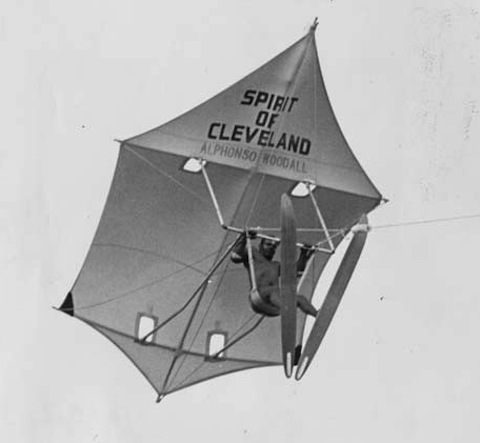
There are few more colorful characters in recent modern Cleveland history than Alphonso Woodall, a daredevil who performed as “The Human Kite.” A former Army Air Force mechanic, Woodall built his own rig so he could soar above Lake Erie with water skis strapped to his feet. His derring-do eventually attracted the interest of a B-grade reality show called You Asked for It, which agreed to pay Woodall $500 for his act—though over dry land, attached to a car instead of a boat.
The stunt did not go well, to say the least, and Woodall sued the show’s producers. He was awarded $70,000, which the producers then appealed. The resulting decision established what is the most important precedent in the arcane field of daredevil law, one that establishes that the men and women who risk their lives for our entertainment are not entirely to blame when things go awry. For even the simplest stunt involves the expert participation of support staff—aid that was sorely lacking in Woodall’s case:
Soon after his arrival in Los Angeles on March 22, 1959, one Hochman drove plaintiff from his hotel to the drag strip where the stunt was to be put on. Hochman said he was to be plaintiff’s driver but when plaintiff discovered he had been driving with his emergency brake partially on he refused to have Hochman. So Welo was assigned by defendant to drive in the exhibition flight. Plaintiff gave Welo explicit and repeated instructions as to speed, signals, etc., and Welo was told to slow the car after reaching a speed of 27-30 miles; he agreed to do so. Plaintiff’s last word to Welo before the flight was, “Remember, now, don’t go over 30 miles an hour,” to which Welo agreed. Welo himself testified by deposition: “I have never represented myself to Mr. Woodall or anybody else as being a driver because I am not.” In fact Welo never held himself out to Henderson as a stunt driver, had never been used as such by defendant, but had been assigned to this stunt notwithstanding the assurances previously given to plaintiff.
On the occasion in question, according to plaintiff, Welo started too slowly, was given a signal to go faster and was supposed to accelerate at once; the kite jumped along and did not take off; then Welo gave a quick surge forward and the kite rocketed up. Plaintiff started giving the wave- off signal (for an emergency stop); the kite reversed itself, but plaintiff still felt a forward motion, the kite began to fall and he could no longer control it. They were jerked along the ground and plaintiff could feel the rope taut and could feel the forward motion. His estimate was that the car got up to 45 miles.
The kite turned over on plaintiff and he was seriously injured. He began to yell, “Too fast, too fast, I told him too fast.” A boy who was about five feet from plaintiff when on the ground heard him, less than a minute after the accident, repeating, “I told him not to go too fast.”
There is a halfway happy ending to this tale, at least for Woodall: Though still hampered by his broken leg in early 1960, he rescued a duck hunter whose boat had capsized on Lake Erie. For this he was awarded a Carnegie Medal for heroism—though, unfortunately, the accompanying $500 cash prize caused him some financial problems down the line.
View more photos of the Curt Flood of daredevil-dom here. Yes, he had an odd grudge against Martin Luther King Jr.—chalk it up to the madness of geniuses.
(Image via The Cleveland Memory Project)


Like gas stations in rural Texas after 10 pm, comments are closed.